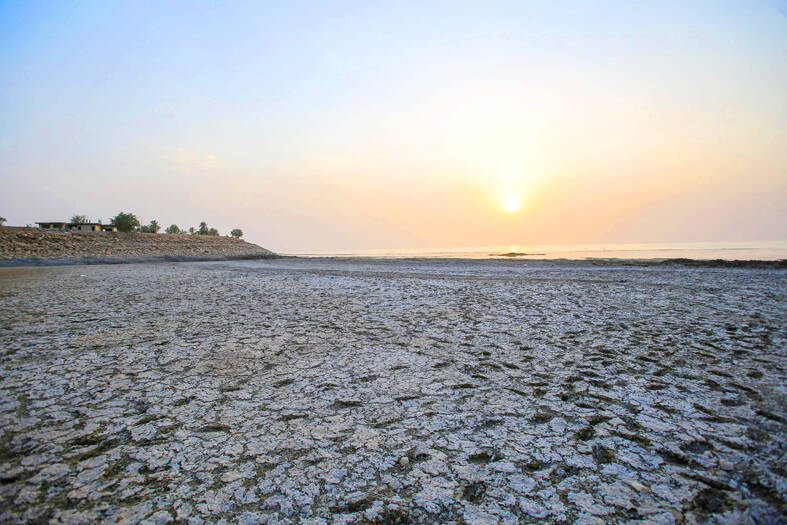Iraqi merchant Mohamed has never seen such a grim tourist season — years of drought have shrunken the majestic Lake Habbaniyah, keeping away the holidaymakers who once flocked there during the summer.
“The last two years, there was some activity, but now there’s no more water,” said 35-year-old Mohamed, asking to be identified by his first name only.
He laid out inflatable water floats, nets and shirts in front of his lakeside shop, but expected few if any customers.

Photo: AFP
“This year, it’s dry, dry,” Mohamed said, his shirt soaked in sweat in the inhospitable heat of nearly 50°C.
Shorelines at Habbaniyah, about 70km west of the capital, Baghdad, have receded by several dozen meters after four consecutive years of drought ravaged parts of the nation.
The UN ranks water-stressed Iraq as one of five nations most impacted by some effects of climate change.
When full, as it last was in 2020, the lake can hold up to 3.3 billion cubic meters of water, said Jamal Odeh Samir, director of water resources in Anbar Province, but now “the lake contains no more than 500 million cubic meters of water.”
Shops like Mohamed’s and holiday homes by the lake now sit empty in the height of summer. On the beach, stray dogs wander between unused umbrellas.
To get to the water, visitors must walk through foul-smelling mud that was once submerged under the lake surface.
The resort was created around the artificial lake in 1979, becoming a popular destination for tourists from across the Middle East in the following years.
Declining rainfall over the past four years and rising temperatures have hit Habbaniyah — alongside much of the rest of the nation — hard.
Baghdad blames upstream dam construction by Turkey on a staggering low water level in the Euphrates River, which feeds the lake and also runs through Syria.
“The strategic water reserves in Iraq are at their lowest point” in nearly a century, said Khaled Shamal, spokesman for the Iraqi Ministry of Water Resources.
Last week during a visit to Baghdad, UN High Commissioner for Human Rights Volker Turk warned that “rising temperatures plus the drought, and the fact that the loss of diversity is a reality, is a wake-up call for Iraq and for the world.”
Sada’a Saleh Mohamed, a local official overseeing finances at the Habbaniyah resort, said that “the lake has receded” and tourism has become “really very weak.”
“The lake has become a pond of stagnant water, unsuitable for consumption or for swimming,” he said.
When evening fell and temperatures dropped slightly, a few people finally arrived to barbecue on the beach.
Qassem Lafta came with his family from the nearby city of Fallujah.
“Before, we would come here and it was much better, the water was higher,” the 45-year-old merchant said.
He said he hoped authorities would revive the lake.
“It’s the only place where people from Anbar, southern Iraq and Baghdad can come to relax,” he said.

A French-Algerian man went on trial in France on Monday for burning to death his wife in 2021, a case that shocked the public and sparked heavy criticism of police for failing to take adequate measures to protect her. Mounir Boutaa, now 48, stalked his Algerian-born wife Chahinez Daoud following their separation, and even bought a van he parked outside her house near Bordeaux in southwestern France, which he used to watch her without being detected. On May 4, 2021, he attacked her in the street, shot her in both legs, poured gasoline on her and set her on fire. A neighbor hearing

DEATH CONSTANTLY LOOMING: Decades of detention took a major toll on Iwao Hakamada’s mental health, his lawyers describing him as ‘living in a world of fantasy’ A Japanese man wrongly convicted of murder who was the world’s longest-serving death row inmate has been awarded US$1.44 million in compensation, an official said yesterday. The payout represents ¥12,500 (US$83) for each day of the more than four decades that Iwao Hakamada spent in detention, most of it on death row when each day could have been his last. It is a record for compensation of this kind, Japanese media said. The former boxer, now 89, was exonerated last year of a 1966 quadruple murder after a tireless campaign by his sister and others. The case sparked scrutiny of the justice system in

DITCH TACTICS: Kenyan officers were on their way to rescue Haitian police stuck in a ditch suspected to have been deliberately dug by Haitian gang members A Kenyan policeman deployed in Haiti has gone missing after violent gangs attacked a group of officers on a rescue mission, a UN-backed multinational security mission said in a statement yesterday. The Kenyan officers on Tuesday were on their way to rescue Haitian police stuck in a ditch “suspected to have been deliberately dug by gangs,” the statement said, adding that “specialized teams have been deployed” to search for the missing officer. Local media outlets in Haiti reported that the officer had been killed and videos of a lifeless man clothed in Kenyan uniform were shared on social media. Gang violence has left

US Vice President J.D. Vance on Friday accused Denmark of not having done enough to protect Greenland, when he visited the strategically placed and resource-rich Danish territory coveted by US President Donald Trump. Vance made his comment during a trip to the Pituffik Space Base in northwestern Greenland, a visit viewed by Copenhagen and Nuuk as a provocation. “Our message to Denmark is very simple: You have not done a good job by the people of Greenland,” Vance told a news conference. “You have under-invested in the people of Greenland, and you have under-invested in the security architecture of this